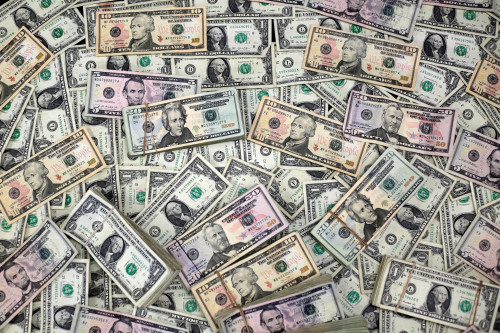By Karen Brettell
(Reuters) -The U.S. Treasury Department saw soft demand for a $16 billion sale of 20-year bonds on Wednesday with investors worried about the country’s increasing debt burden as Congress wrangles with a tax and spending bill that is expected to worsen the fiscal outlook.
The poorly received auction, which saw stocks and the dollar sell off while U.S. Treasury yields rose, shows intensified investor worries about the country’s ballooning debt that could spur bond market vigilantes who want more fiscal restraint from Washington.
It comes after Moody’s on Friday cut the United States’ sovereign rating from the top “Aaa,” adding to previous downgrades from Fitch Ratings and Standard & Poor’s.
Republicans were on Wednesday trying to find unity around a tax-and-spending bill which is expected to add trillions to the country’s debt.
“We have a legacy deficit problem and it doesn’t seem to be going away… there’s just too much debt out there and I think the market’s fighting with the government right now and trying to figure out if we can get this deficit down,” said Tom di Galoma, managing director at Mischler Financial Group.
The auction saw debt sold at a high yield of 5.047%, around one basis point above where it had traded before the sale. Indirect bidders, which can include governments, fund managers and insurance companies, took an above-average portion of the sale at 69%, indicating that foreign demand remained solid. Overall demand was slightly below average at 2.46 times the amount of debt on offer, the weakest since February.
Yields on the 20-year debt rose after the auction to 5.127%, the highest since November 2023.
“We’ve seen several soft 20-year bond auctions and it has a checkered history as a benchmark issue,” said Thomas Simons, chief U.S. economist at Jefferies in New York. “This one was not one of the best by any stretch of the imagination, but it also wasn’t one of the worst.”
Simons said while the auction was “far from a disaster,” it showed there was not going to be a reversal in the sell-off at the long end of the yield curve anytime soon.
George Cipolloni, portfolio manager at Penn Mutual Asset Management, said there were concerns regarding U.S. budget deficits.
“(Long-term) yields of 5% with another auction not doing well is not a sign people are feeling good about the U.S. economy,” said Cipolloni, who said he was underweight bonds.
SPENDING BILL WORRIES
Investors are worried that the tax and spending bill in Congress will worsen the deficit at a faster pace than previously expected.
“Either the U.S. has to sharply revise the current reconciliation bill currently sitting in Congress to result in credibly tighter fiscal policy; or, the non-dollar value of U.S. debt has to decline materially until it becomes cheap enough for foreign investors to return,” Deutsche Bank FX analyst George Saravelos said in a report sent after the auction.
The three major U.S. stock indexes posted their biggest drops since April 21 on Wednesday. Benchmark 10-year Treasury yields reached 4.607%, the highest since February 13.
“The markets, or at least the marginal traders, are very much concerned about how supply will affect the clearing levels for longer-term Treasuries,” said Guy LeBas, chief fixed income strategist at Janney Montgomery Scott.
“Ultimately, I believe that the U.S. interest rate markets are dominated by economic conditions more than supply,” and yields will likely decline this year with a weakening economy, LeBas said. “But for the moment, it’s just not time to step in front of that particular freight train.”
A handful of hardline U.S. House of Representatives Republicans, concerned that President Donald Trump’s tax cut bill does not sufficiently cut spending, were headed to the White House on Wednesday.
The Committee for a Responsible Federal Budget, a nonpartisan think tank, estimates the bill could add roughly $3.3 trillion to the country’s debt by 2034, or around $5.2 trillion if policymakers extend temporary provisions.
At the same time, investors fear that Trump’s back-and-forth tariff policies will not only stoke inflationary pressures but also erode the appeal of U.S. assets. This week, yields in Japan and the euro zone, too, have risen.
Longer-dated Treasuries took the brunt of bond market weakness after Trump on April 2 announced larger-than-expected tariffs on trading partners, as well as being hurt by fiscal concerns.
While the U.S. Treasury Department in April said it expects to keep auction sizes steady for at least the next several quarters, analysts expect the U.S. government will need to increase the size of its longer-dated debt auctions at some point, most likely early next year, to fund the expanding budget deficit.
The 20-year bonds typically see less demand than other maturities, including the benchmark 10-year notes and 30-year bonds, which are favored by life insurance companies and pension funds.
The maturity was reintroduced in May 2020 following a hiatus since 1986.
(Reporting by Karen Brettell; Additional reporting by Chuck Mikolajczak and Davide Barbuscia; Editing by Megan Davies and Andrea Ricci)


